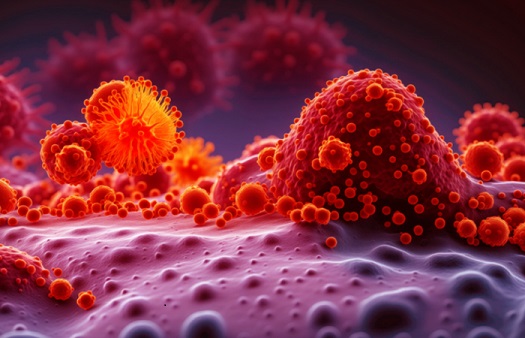Nikhil Prasad Fact checked by:Thailand Medical News Team Jan 26, 2025 2 months, 3 weeks, 4 days, 11 hours, 28 minutes ago
Medical News: Scientists at the Medical University of Graz in Austria have conducted groundbreaking research on the role of GPR55, a receptor in the expanded endocannabinoid system, in the tumor microenvironment (TME) of pancreatic cancer. This receptor has previously been associated with promoting cancer growth in various models. However, its role within the immune cells of the TME remained unexplored until now.
 GPR55 Role in Pancreatic Cancer
GPR55 Role in Pancreatic Cancer
This
Medical News report delves into how researchers utilized a pancreatic ductal adenocarcinoma (PDAC) mouse model to uncover how GPR55 influences immune cell behavior and tumor growth. By studying both wild-type (WT) and GPR55-deficient mice, they aimed to clarify whether removing GPR55 from TME cells would alter cancer progression.
What Is GPR55?
GPR55, or G protein-coupled receptor 55, is a receptor belonging to the extended endocannabinoid system (ECS). The ECS is a network of receptors, enzymes, and signaling molecules involved in regulating various physiological processes, including immune responses, metabolism, and inflammation. Unlike the more well-known cannabinoid receptors CB1 and CB2, GPR55 is considered an "orphan receptor" because its exact natural ligand remains unclear. However, it has shown responsiveness to certain lipid molecules, including those found in the ECS.
GPR55 has gained attention in recent years for its pro-tumorigenic properties, meaning its potential to promote tumor growth. It is expressed in cancer cells and various immune cells within the tumor microenvironment (TME), including T cells, macrophages, and myeloid-derived suppressor cells. Its presence is linked to suppressing anti-tumor immune responses, which facilitates tumorigenesis - the process through which normal cells transform into cancerous ones and contribute to tumor development and progression.
GPR55’s Role in Pancreatic Cancer Tumorigenesis
Pancreatic cancer, specifically pancreatic ductal adenocarcinoma (PDAC), is one of the most aggressive forms of cancer with a notoriously poor prognosis. The tumor microenvironment in PDAC is highly immune-suppressive, which hinders the effectiveness of immunotherapies. GPR55 is highly expressed in both pancreatic cancer cells and the surrounding immune cells in the TME.
The study team hypothesized that targeting GPR55 in the TME could disrupt the tumor-supportive environment, leading to reduced tumor growth.
Their findings revealed that GPR55 promotes tumorigenesis by suppressing T cell migration and activity within the TME. By inhibiting or removing GPR55, they observed smaller tumors and a more robust anti-tumor immune response, including increased infiltration of cytotoxic CD8+ T cells, which are essential for attacking cancer cells.
Why Is This Important?
The discovery of GPR55’s role in tumorigenesis is a significant breakthrough. It highlights the receptor as a potential therapeutic target for pancreatic cancer. By blocking GPR55,
it may be possible to reprogram the immune environment of pancreatic tumors, making them more susceptible to immunotherapies and other treatments. This approach could offer new hope for patients battling this deadly disease.
Key Study Findings
The researchers found that tumors in GPR55-deficient mice were significantly smaller in both weight and volume compared to those in WT mice. Importantly, the immune cell composition within the TME was markedly different between the two groups. The absence of GPR55 appeared to foster an anti-tumorigenic environment characterized by:
-Increased infiltration of CD3+ T cells, particularly the CD8+ subtype.
-Higher expression of immune-stimulating chemokines such as CXCL9 and CXCL10.
-Enhanced migration of T cells towards tumor sites due to the CXCR3/CXCL9 axis.
Additionally, RNA-sequencing revealed that tumors from GPR55-deficient mice exhibited higher activity in pathways related to T cell signaling and antigen presentation. These findings suggest that GPR55 plays a role in suppressing T cell activity, contributing to tumor growth in pancreatic cancer.
Exploring the Role of Immunotherapy
The study also tested the effects of anti-PD-1 immunotherapy, a treatment designed to boost the immune system’s ability to fight cancer. Surprisingly, while this therapy increased tumor burden in WT mice, it had no such effect in GPR55-deficient mice. This discrepancy indicates that GPR55 may influence how tumors respond to immune checkpoint inhibitors like anti-PD-1 antibodies.
Implications for Future Treatments
These findings open the door to new therapeutic strategies targeting GPR55 in pancreatic cancer. By inhibiting GPR55, it may be possible to enhance T cell infiltration and activity, potentially overcoming the immune-suppressive environment typical of pancreatic tumors. Combining GPR55 inhibitors with existing immunotherapies could further improve outcomes for patients with this challenging cancer type.
Study Conclusion
The research underscores the critical role of GPR55 in shaping the tumor microenvironment of pancreatic cancer. By removing GPR55, the researchers demonstrated a shift towards a more immune-responsive state, marked by increased T cell activity and reduced tumor growth. These findings suggest that targeting GPR55 could be a promising approach in future immunotherapy strategies.
The study findings were published in the peer-reviewed journal: Frontiers in Immunology.
https://www.frontiersin.org/journals/immunology/articles/10.3389/fimmu.2024.1513547/full
For the latest Cancer News, keep on logging to Thailand
Medical News.
Read Also:
https://www.thailandmedical.news/news/new-findings-link-kifc1-to-pancreatic-cancer-development-and-progression
https://www.thailandmedical.news/news/hoxa11as-and-its-role-in-pancreatic-cancer-progression
https://www.thailandmedical.news/news/targeting-glutathione-peroxidase-as-a-game-changer-in-pancreatic-cancer-treatment
https://www.thailandmedical.news/news/new-study-finds-link-between-high-hba1c-levels-and-pancreatic-cancer-risk
https://www.thailandmedical.news/news/the-unexpected-connection-between-covid-19-and-pancreatic-cancer
https://www.thailandmedical.news/news/new-hope-for-pancreatic-cancer-treatment-fungi-derived-bioactive-compounds
https://www.thailandmedical.news/news/aronia-berry-extract-overcomes-pancreatic-cancer-drug-resistance-via-myd88-nf-kb-p-glycoprotein-modulation
https://www.thailandmedical.news/articles/cancer
